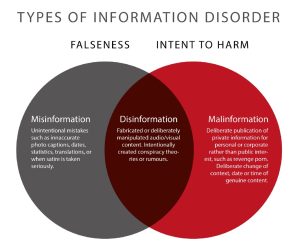15 Information Disorder and Knowledge Check
Claire Wardle, a world-renowned expert in the areas social media, user generated content, and verification, has used “information disorder” as an umbrella term for the various types of false, misleading, manipulated, or deceptive information we have seen flourish in recent years. She also created an essential glossary for information disorder, with definitions for related words and phrases.
What is Information Disorder?
An umbrella term for the various types of false, misleading, manipulated, or deceptive information also categorized as misinformation, disinformation and malinformation.
- Misinformation is information that is false, but not intended to cause harm.
For example, the person sharing or creating it believes it to be true because they are emotionally connected to the information.
- Disinformation is false information that is deliberately created or disseminated with the express purpose to cause harm. Producers of disinformation typically have political, financial, psychological or social motivations.
For example, the person sharing or creating it knows the information is false.
- Malinformation is information that is true and factual, but it is intentionally conveyed in order to inflict actual harm or cause the imminent threat of actual harm on a person, organization or country.
For example, the person sharing or creating it knows the information is true and factual, but uses the information to deliberately deceive or cause harm.
The graphic below illustrates the scale and range of intent behind false information, from unintentionally inaccurate to deliberately deceptive and harmful. For a much more detailed explanation of each form of information disorder, from “satire” to “fabricated content” to “false context,” see First Draft’s Essential Guide to Understanding Information Disorder.

Knowledge Check
Sources
This section includes material from the source book, The Insiders: Information Literacy for Okies Everywhere, as well as the following:
“First Draft’s Essential Guide to Understanding Information Disorder” by Claire Wardle is licensed under CC BY-NC-ND 4.0.
Image: “3 Types of Information Disorder” graphic by Claire Wardle & Hossein Derakshan is licensed under CC BY-NC-ND 3.0.
"Information that is false, but not intended to cause harm. For example, individuals who don’t know a piece of information is false may spread it on social media in an attempt to be helpful." Definition from "Information Disorder: The Essential Glossary" by Claire Wardle.
"False information that is deliberately created or disseminated with the express purpose to cause harm. Producers of disinformation typically have political, financial, psychological, or social motivations." Definition from "Information Disorder: The Essential Glossary" by Claire Wardle.
"Genuine information that is shared to cause harm. This includes private or revealing information that is spread to harm a person or reputation." Definition from "Information Disorder: The Essential Glossary" by Claire Wardle.

